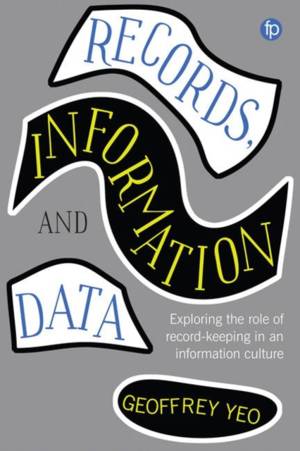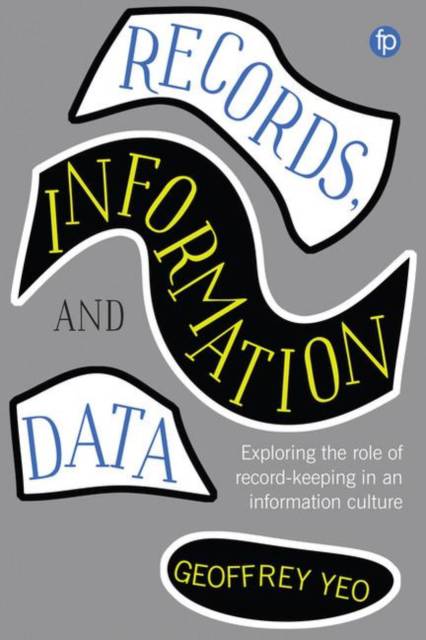
En raison d'une grêve chez bpost, votre commande pourrait être retardée. Vous avez besoin d’un livre rapidement ? Nos magasins vous accueillent à bras ouverts !
- Retrait gratuit dans votre magasin Club
- 7.000.000 titres dans notre catalogue
- Payer en toute sécurité
- Toujours un magasin près de chez vous
En raison de la grêve chez bpost, votre commande pourrait être retardée. Vous avez besoin d’un livre rapidement ? Nos magasins vous accueillent à bras ouverts !
- Retrait gratuit dans votre magasin Club
- 7.000.0000 titres dans notre catalogue
- Payer en toute sécurité
- Toujours un magasin près de chez vous
Records, Information and Data
Exploring the Role of Record Keeping in an Information Culture
Geoffrey Yeo
121,95 €
+ 243 points
Description
This dynamic book considers whether and how the
management of records (and archives) differs from the management of information
(and data).
Can archives and records management still make a
distinctive contribution in the 21st century, or are they now being dissolved
into a wider world of information governance? What should be our
conceptual understanding of records in the digital era? What are the practical
implications of the information revolution for the work of archivists and
records managers?
Geoffrey Yeo, a distinguished expert in the global
field, explores concepts of 'records' and 'archives' and sets today's
record-keeping and archival practices in their historical context. He
examines changing perceptions of the nature and purpose of records management
and archival work, notions of convergence among information-related
disciplines, and archivists' and records managers' attitudes to information and
its governance.
Starting with Peter Morville's dictum that 'when we try
to define information, we become lost in a hall of mirrors', Yeo considers
different understandings of the concept of 'information' and their
applicability to the field of archives and records management. He also
looks at the world of data science and data administration, and asks whether
and how far recent work in this area can enhance our knowledge of how records
function and how they relate to the information universe.
Key topics covered include:
- The keeping of
records: a brief historical overview - Thinking about
records and archives: the transition to the digital - Archivists,
records managers and the allure of information - Finding a way
through the hall of mirrors: concepts of information - Records and
data - Why records are
not (just) information; understanding records in the digital era.
This thought provoking and timely book is primarily
intended for records managers and archivists, but should also be of interest to
professionals in a range of information-related disciplines. In addressing the
place of record-keeping in contemporary information culture, it aims to
provide a balance of theory and practice that will appeal to practitioners as
well as students and academics around the world.
Spécifications
Parties prenantes
- Auteur(s) :
- Editeur:
Contenu
- Nombre de pages :
- 192
- Langue:
- Anglais
- Collection :
Caractéristiques
- EAN:
- 9781783302260
- Date de parution :
- 27-07-18
- Format:
- Livre broché
- Format numérique:
- Trade paperback (VS)
- Dimensions :
- 156 mm x 233 mm
- Poids :
- 361 g

Les avis
Nous publions uniquement les avis qui respectent les conditions requises. Consultez nos conditions pour les avis.






